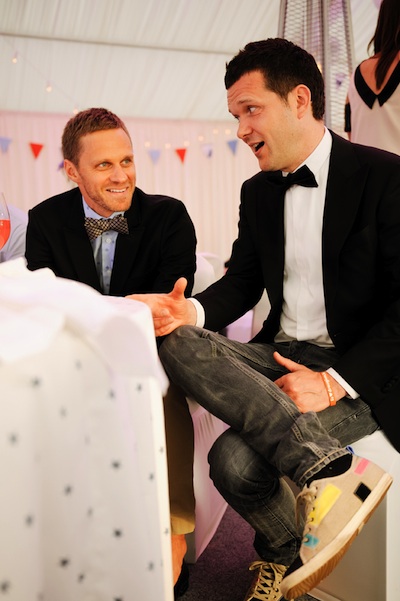In Latvia, Draugiem is as much a household name as Facebook is everywhere else.
The majority of the world’s Latvian-speaking population — more than 1.2 million people — uses Draugiem.lv, a social networking site that launched back in April 2004, right when Facebook did.
“We are the last country in Europe standing against Facebook,” says Draugiem Group founder, Lauris Liberts. “We’re still larger than Facebook in Latvia.” He posits that’s because Latvians prefer homegrown brands: “Facebook is very international, Draugiem is very local. Latvia is a very small country. It’s unique. We don’t have room left to grow. All the people who might have joined are already using it.”

In 1999, Liberts was bussing tables in New York. The Internet bubble was at its peak. Intrigued by the abundance of startup fairytales, he wanted a piece — but he didn’t have a clue about the industry. He’d worked at a bank back home in Latvia, so figured he’d stick with finance and copycat a Latvian version of the Lending Tree model.
It didn’t go so hot. Liberts managed to scrape by and make enough for food and rent, until he met some small investors. They took out some small loans themselves; they started brokering their loans. But not everyone paid them back.
His first foray into online entrepreneurship may have been a dud, but Liberts is a hustler at heart. “I think my inner being is experimenting,” he says. “I just love to explore things, and I have to actually back myself off in order not to pursue every idea that comes into my mind.”
On the side, he’d come upon sites offering customized shirts — so he built one of his own. Customers could enter text, preview it on the shirt, and place their order. It was a one-man operation; production was outsourced. The shirt business was small, but more successful than the Lending Tree lookalike.
“I needed to advertise but I didn’t have any money,” Liberts recalls. “So I thought, ‘OK, let’s build something myself that is popular, so I can advertise my shirts.’” He explored different dating sites and social networks, and found Friendster (aw, remember?). “That’s when I got the bug,” he says.
Undeterred by his first inauspicious copycatting attempt, Liberts and his partner, Agris Tamanis, built a simple, invite-only site based on the Friendster format. “Initially, I thought if I get 10,000 people, I could advertise my shirts, he says. “That’s how it all started.”

“We obviously invited our friends,” Liberts says. “Those friends invited their friends, and we saw these little communities springing up all across the country. ... I think on the first day we registered a couple hundred. On day two we registered 1,000. From then on it just snowballed. For the first three years, we were struggling enormously keeping up with traffic. Our servers crashed; we didn’t have any knowledge of how to scale.”
For instance, the script triggered by a new friendship request had to run through all the relationships in the database, and the site was so slow it could take up to three days to accept it. Draugiem hired some hotshot programmers and decided to rewrite the entire site from PHP to C++, but not before the original site completely broke down. “We had not finished the new version,” Liberts remembers. “I just made this leap of faith that for three days we would be offline.” He sat up on Christmas night, fretting about competitors and wondering whether the venture was doomed. “It was lonely, yet a very interesting time.”
That vulnerability — the threat that despite its early popularity, there were no guarantees it would last — galvanized the company’s first efforts toward diversification. Their first startup, the GPS system Mapon, was established in 2006 and laid the foundation for the Draugiem Group. In 2008, they launched the SMS service that became Text2Reach.
Liberts and Tamanis were approached by VCs, but never really took the bait — “VC funding is not that popular back in Europe,” Liberts says. Of all the startups in Draugiem Group’s incubator, only Vendon, a remote vending machine service, benefited from outside investment. The group also partnered with Lattelecom, Latvia’s largest internet and telecom service provider, for a short while: back when Draugiem was having trouble scaling their servers, they agreed to hand 30 percent of their income over to Lattelecom in exchange for hosting on their service. The barter didn’t work out, and Draugiem bought itself out of the agreement. They’re currently running on about 200 servers of their own.
Today, Draugiem Group is an umbrella organization that along with Draugiem.lv, houses 16 startups including a daily deal site, a time tracking app, even a custom bracelet company, among others. Last year’s revenues totaled more than €14 million (Latvian law requires public financial disclosure even for privately held companies), and profits of nearly €800,000. Most of the group’s 100+ employees work out of the company’s swanky office in Riga, Latvia, although a couple work in the satellite office located in Burbank, Calif.
Draugiem invests substantially in employee wellbeing and morale, with shorter hours in the summer, office catering, and company parties and retreats. Liberts and Tamanis are both late sleepers, so it’s not unusual for them to roll in around 11 a.m. “That’s an acceptable hour,” Liberts says. “You can get burned out. It’s not sustainable in the long term if you are putting in 10- to 12-hour days.” He describes the culture as open and flat, so “anyone can stand up to anyone” and no one is more important than anybody else. “We want people to make stuff they’re interested in,” says Liberts. “If you’re not fond of doing this particular job but you … want to switch to phones, learn a new language, we encourage that.”
Such liberality comes easily when you’re basically building companies for fun. “Work is not all about maximizing profit,” Liberts says. “Work is a lifestyle.” He encourages anyone who wants to start a business to go ahead and do it, “if they think that there’s a chance of them succeeding — but avoid all the buzzwords that are out there on there on the Internet: cloud, big data, social monitoring. When you have these new technologies springing up, like Twitter, there are hundreds of wannabe services. In the end it’s not the best service that wins, it’s the most well-connected, deep-pocketed business.”
What’s worked for Draugiem is a sustained effort to find under-the-radar, unique niches that can still flourish as a business, Liberts says. “We kind of have a key to the Latvian soul, and that might be what’s working.”
Visit Draugiem Group.
“Bootstrapped, Profitable, & Proud” is a Signal vs. Noise series highlighting profitable companies with $1 million+ in revenues that didn’t take VC.

Michael
on 18 Sep 13Interesting. For how long did the T-shirt business pay for development of the social network? When did the other businesses begin to sustain themselves?
Alaksiej Nieścieraŭ
on 19 Sep 13When reading this post, I recalled, that there also was `one.lv’ social network in Latvia. And how disgusting that was to find out they were acquired by `odnoklassniki.ru’.
Arjan Tupan
on 19 Sep 13Nice post. I’ve lived in Latvia for a few years, and never really got Draugiem. It is a bit like what Hyves was in The Netherlands, and by some measures (like the current site ranking by Alexa), Draugiem is losing ground to Facebook in Latvia. However, what I really like about this company, is how they’ve turned their success into an incubator for other projects. Latvia is an exciting place for startups, thanks to Draugiem, TechHub and other great initiatives in the Baltics, some financed by the Estonian founders of Skype.
dmitri
on 19 Sep 13Ok
Janis
on 20 Sep 13Alaksiej – One.lv team actually developed odnoklassiniki.ru, and later merged one.lv into the bigger project.
This discussion is closed.